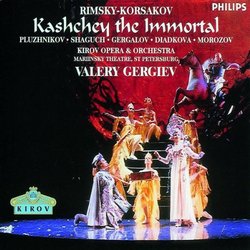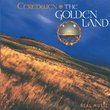| All Artists: Nikolai Rimsky-Korsakov, Valery Gergiev, St.Petersburg Kirov Orchestra, Alexandr Gergalov, Alexandr Morozov, Konstantin Pluzhnikov, Larissa Diadkova, Marina Shaguch Title: Rimsky-Korsakov: Kashchey the Immortal Members Wishing: 2 Total Copies: 1 Label: Philips Release Date: 11/9/1999 Genre: Classical Style: Opera & Classical Vocal Number of Discs: 1 SwapaCD Credits: 1 UPC: 028944670424 |
Search - Nikolai Rimsky-Korsakov, Valery Gergiev, St.Petersburg Kirov Orchestra :: Rimsky-Korsakov: Kashchey the Immortal
 | Nikolai Rimsky-Korsakov, Valery Gergiev, St.Petersburg Kirov Orchestra Rimsky-Korsakov: Kashchey the Immortal Genre: Classical
![header=[] body=[This CD is available to be requested as disc only.]](/images/attributes/disc.png?v=5b450bfd) ![header=[] body=[This CD is available to be requested with the disc and back insert.]](/images/attributes/disc_back.png?v=5b450bfd) ![header=[] body=[This CD is unavailable to be requested with the disc and front insert at this time.]](/images/attributes/greyed_disc_front.png?v=5b450bfd) ![header=[] body=[This CD is unavailable to be requested with the disc, front and back inserts at this time.]](/images/attributes/greyed_disc_front_back.png?v=5b450bfd) |
Larger Image |
CD DetailsSimilarly Requested CDs
|
CD ReviewsWell done David A. Hollingsworth | Washington, DC USA | 12/19/1999 (5 out of 5 stars) "The operas of Nikolai Andreyevich Rimsky-Korsakov (1844-1908) has really been propping up since the 1940s, thanks to conductors such as Nikolai Golovanov, Vassily Nebolshin, Yevgeni Svetlanov, Vladimir Fedoseyev, and finally Valery Gergiev. There recordings were important since they give us the idea of the true essence of the composer: his operas. Forget Cappricio Espanol, Scherharazade, and the Russian Easter overture. His most important and influential contributions were in his operas and Rimsky-Korsakov was among the giant of middle-to-late 19th century opera (as with Wagner, Massenet, Verdi). Rimsky-Korsakov made the most contributions in Russian opera, as a composer and as editor/completist of operas of Dargomyzhsky, Mussorgsky, and Borodin.Kashchey the Immortal of 1901 (premiered by 1902), as with the Invisible City of Kitesh, and the Golden Cockeral, departs from the idiom of the late 19th Century where folkmusic dominated. Instead, the idiom, not only Wagnerian, is advanced and not far from the Scriabinian mysticism so much alive and longlasting. There's something else, however. The late operas began to symbolize the growing discontent with the Tsarist Regime (especially the Golden Cockeral) and his students began to use his operas in denouncing Tsar Nicholas II. Alexander Glazunov, for example, conducted Kaschchey the Immortal by 1906 with student singers and student orchestra of the St. Petersburg Conservatory as a form of defiance against the Tsar, before the police distrupted the performance and dispersed the musicians and the audience alike. The importance of Rimsky-Korsakov's operas (whether early or late) cannot be overlooked and Valery Gergiev and the Maryinsky (Kirov) Theater Orchestra and Chorus had, in the 1990s, done the composer a great justice in reminding us of that importance. Their performance of Kashchey the Immortal where done with upmost vividness and imagination, with the great ability in depicting the story behind this interesting work. Konstantin Pluzhnikov (as Kaschey the Immortal) sang with command and a clear depiction of his character: very convincing and telling. Marina Shagugh sang with affection and really brought out the anguish and tormentation of the Princess longing for a happier, fulfilling life. Larissa Dyadkova, the Irina Arkhipova of the 1990s, portrayed Kascheyevna as torn between her sympathy towards the Princess and her loved one, Prince Ivan Korolevich (well-played by Alexander Gergalov) and the well-being of her father (Kaschey the Immortal). A predicament no doubt, for if Kashcheyevna shows emotions and weeps tears, her father will face mortality (and it did happened at the end). Finally, Alexander Morozov sang the Storm Knight with sterness and vividness.My recommendation is to play Kashchey the Immortal with Bartok's Bluebeard Castle. You'll find some interesting and disquieting parallelisms between the two. My hope is that the recordings of Golovanov, Nebolshin, Svetlanov, and Fedoseyev of Rimsky-Korsakov's operas will be re-issued and released (and soon!). For instance, Nebolshin's recording of Rimsky-Korsakov's Legend of the Invisible City of Kitezh is by far the best recording ever made whereas Golovanov's recordings of the composer's Sadko (and Christmas Eve) are among the best this century has to offer. Svetlanov's recording of Mlada and the Golden Cockeral and Fedosyev's recording of the Snow Maiden are among the gemstones of Russian Operetic recordings.Nevertheless, this Philips recording of Gergiev and the Kirov Orchestra and Chorus is highly recommended, with no apologies!" Dark and pithy fantasy. Julian Grant | London, Beijing, New York | 12/16/1999 (5 out of 5 stars) "This is a real rarity and it is good to have a performance as strong and well sung as this - I can't imagine that it will get staged in the West that often. Kaschey is a sorcerer familiar from Russian folklore (and Stravinsky's ballet 'The Firebird')- here played with nasal intensity and some humour by tenor Konstantin Plushnikov. In the original folktale (and in Stravinsky) his death is hidden away in an egg, here it is hidden away in his heartless daughter's tears - this role, Kascheyevna is the most interesting and reflects Rimsky's current interest in Wagner, a woman who finds redemption through love and who of course cries at the end and turns into a weeping willow (magical orchestral passage here). The singing is consistently excellent and makes you marvel at the vocal talent coming out of Russia at present. Larissa Diadkova as Kascheyevna and Marina Shaguch as the captured Tsarevna give wonderful, full throated performances. And the music? Strange - there are lots of Wagnerian echoes, but also some extraordinarily piquant orchestral moments and very advanced (for the time) harmonic writing - a grotesque chorus of snowflakes where Rimsky depicts wind blowing through the strings of an Aeolian harp is especially memorable, and there is sensuous, but calculated music for Kascheyevna - verging close to russian Debussy at times. Parts of the opera are very intense and belie Rimsky's reputation as a light-weight confectioner. Unfortunately there are some weak moments where the conventional apparatus of opera takes over - an obligatory reunion love duet with a one-dimensional Knight, who is a hero (and nothing much else) and who is accompanied by a stock fanfare wherever he goes. But Gergiev shapes the piece sensitively and helps the work through the occasional trite or repetitive passage.Historically it's an interesting piece too, as it was premiered at about the time (1902) mass student unrest was proliferating in Russia - and in fact a performance of it was followed by a political meeting that saw the piece as an allegory of oppression. Kaschey and his moribund kingdom drew parallels with the reign of Tsar Nicholas II, leading to a police raid and a banning of Rimsky's work for some months. Give this a try; it's short, pungent, strange and beautifully performed." Underappreciated, Lesser Known Gem David A. Hollingsworth | 03/22/2000 (5 out of 5 stars) "I have had an interest in Russian and Eastern Eureopean composers and their operas for years, largely because of the efforts of the Metropolitan Opera and conductors like the great Charles Mackerras. Now, thanks still to the Met, there is another great conductor, Maestro Valery Gergiev. This past Saturday, I listened glued to the radio to the Met broadcast of Lady Macbeth of Mtsenk. It was after that broadcast, conducted by Maestro Gergiev, that I moved from a fan to a fanatic. I have since purchased Kashchey and can't put it down! I have been a fan of Rimsky-Korsakov since twenty years ago I played Procession of the Nobles in my high school concert band. I can't wait to immerse myself in the other Gergiev/Kirov/Phillps compliations. A review of a Phillips recording would not be complete without saying something about the recording company - UNBEATABLE. Thanks to all parties involved for changing my life and enhancing the greastest of all art forms. Thanks too, Amazon.com for providing these recordings, many of which you can't find in stores, and for allowing listeners to express their views"
|

 Track Listings (12) - Disc #1
Track Listings (12) - Disc #1







